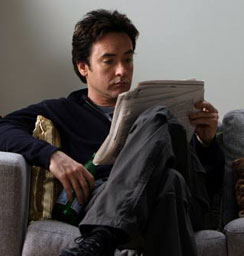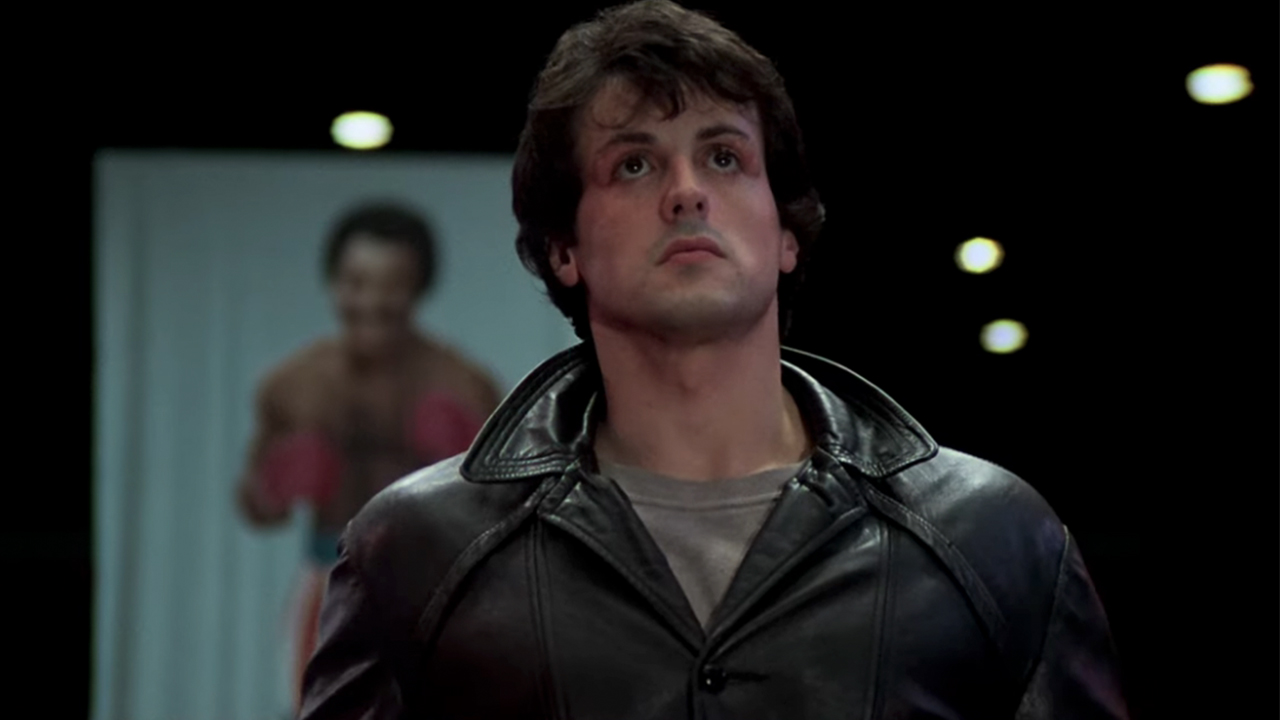Interview: John Cusack

As you will see in a moment, John Cusack walked into his roundtable interview listening to Bruce Springsteen’s latest album on his iPod. When I got home that afternoon, I bought it—that’s just the kind of influence Cusack has. Practically a genre unto himself by now—a quirky smart aleck with a heart of gold—Cusack is growing up this fall, playing two fathers with tough decisions to make, both in December’s Grace is Gone and the upcoming Martian Child. As a science fiction writer who decides to adopt a most unusual young boy, Cusack does both dramatic heavy lifting and his trademark easygoing comedy. He also reteams with his sister Joan, marking their eighth collaboration on film, and Menno Meyjes, his director from 2002’s Max.
[John Cusack walks in listening to an iPod]
What are you listening to?
Springsteen’s new album.
Do you like it?
I do. A lot. Now I’ve got to figure out how to turn it off.
So you’re playing a lot of serious, dramatic parents, between this and Grace is Gone. What do you like about playing them?
Your Daily Blend of Entertainment News
It’s just total coincidence—two good projects came along. There’s no other rhyme or reason to it actually.
Does it make you want to have kids?
I don’t know. Yeah, theoretically. Usually I do everything reverse. I practice something in movies and then I try it in real life. I just do it in reverse—like if I work out, I get smaller. I don’t know why.
It takes a very unique person to adopt a child with special needs. Do you think you could ever do something like that?
I don’t know. I really don’t know. I’d like to think I would. Hopefully as you get older you get more selfless. That would be probably a good goal. I don’t know if we do, though. I’ll have to see, right? I’ll have to see what I do. I can talk a really big game if you want.
How often do you and Joan see each other?
My sister doesn’t talk on the phone. You have to go to her house to get her.
Do you guys live close together?
In Chicago we do. I won’t call, because she won’t answer the phone, so I just go over.
Any good memories of shooting together on this film?
Yeah, I always love working with her. I can’t believe they still let us to do it.
What is it that makes you make the effort every time to coordinate your schedules and work together?
We don’t really. It’s just a project that comes up. If I’m producing it, and usually there’s a really funny role, I just ask her to do it, because I know she’s just going to kill it, she’s just gonna crush it. It’s a no-brainer. She’s the best. She’s just a completely unique performer. People just love her. Like, way more than me. Way more than anyone. She’s definitely the most gifted. This guy said, you know, there’s a part for your sister. It was New Line’s idea. I loved it.
Amanda had high praise for her as well.
Yeah, everyone does. She’s like Jordan-esque. She’s just money.
What were you like as a kid?
I don’t know. What were you like?
I don’t know! But I mean, in school, were you an outcast?
Oh, I see. I was more on that end—I never belonged anywhere. I was never into the popular school or clique or anything. Then I started doing movies when I was in high school, so then I got popular. Then the girls paid attention to you who didn’t before. It’s like, ‘Oh, that’s how this works.’ I had friends, we were obsessed with playing baseball and baseball cards and all that same stuff. Kids don’t start getting really mean until they’re in junior high, high school. That’s when it starts getting really mean, right? Though I don’t know, maybe 8-year olds too. It gets a certain age where the world starts to beat you down a little bit. My friend thinks that if you want to see the Buddha, go to a 12-year old. Their bullshit detectors are the best. The world hasn’t beaten them down, they haven’t gone through puberty and all that craziness, where all the hormones start going crazy and they start to lose their minds over boys or girls or whatever it is. When I worked on this with Bobby, he was younger than that, but I worked with him and a young girl, Shelan O’Keefe, on Grace is Gone-- man, they know everything. They’ve got it all together. It’s pretty cool.
It’s kind of intimidating isn’t it? You know they can see right through you.
Yeah. If you’re bullshitting, they know. It’s great.
Do you like playing writers?
I don’t know, I don’t think like that. Maybe it’s the idea of playing people who are trying to figure stuff out. The craftsmen, I guess.
What’s going on with [upcoming project] Stopping Power?
It fell apart. The company was naughty and was doing some Enron-ing—getting their Enron on I guess. They weren’t paying the crew, they weren’t paying anybody.
The stuff that New Line gave us says it’s still in production.
I was supposed to be there now—I was supposed to be coming from Germany. I think they’re going to do it next year. They’re liable for a lot of money to a lot of people.
Did you take note of Bobby Coleman when he was in Must Love Dogs?
I wasn’t in that scene, so I didn’t see it. Then I met him and he says ‘Oh yeah, we’ve worked together.’
How much improvisation between you and Bobby made it onscreen?
Menno and I worked on it a lot, we worked with Bobby and the writers. There’s always a certain amount of that in certain stories that you do. It’s not really as much of a plot-driven movie as it is about the behavior and the characters and the connections.
The scene between you and Joan feel really improvisational.
Yeah, we like to riff. I like to riff and do stuff.
What was it that you liked about working with Menno on Max that made you want to team up with him again? That was a pretty tough movie to try to get made, so we kind of went through the worst together a little bit. He’s a very poetic, intelligent man. His take on the material was really interesting.
Was it different working with him on something less intense? No, we work in a pretty intense way. It was still emotional. He’s trying to reach this kid and he’s not getting much back. I’ve seen that from a couple parents who I know who have kids with special needs—they’re so dying for that connection, they’re giving and they’re giving and they’re giving and they’re trying to get it back. It’s very difficult.
The press notes talk about you developed your relationship with Bobby, not talking to him in the beginning and everything.
We sort of let it evolve like it was in the movie. We sort of met each other onscreen and then kept building it.
Did you find it easier with them filming it in chronological order?
I try to do that as much as you can, because you learn so much by doing something. It’s like a jigsaw puzzle—the more you can do it sequential, the more you know. You just get the momentum and the knowledge of it. You can’t always—it’s almost impossible, because there’s so much money and moving pieces around. If you can get away with it, great.
What was the most fun scene to film?
I had a good time most of the time. I liked the scenes where he’s connecting with Dennis. I liked the scene where they’re talking at the pool table and talking about Winston Churchill.
You seem to have a knack for picking very zeitgeist-y roles.
But they only become zeitgeisty after or before I make them.
Do you know what in advance—like when you picked High Fidelity, did you know it was going to be representative of a certain generation? Do certain scripts jump out at you as something special?
Yeah, or you work on them. Like with that one we adapted the book. I wrote it with my partner. We knew the book, and I thought, well, this tells the truth about men. This tells the truth about men our age at that time. You knew that that book is a generational, iconic book.
Has anything become iconic that surprised you?
Yeah, I think so. You do stuff, and you just don’t know when something will be found interesting right when it comes out. That’s all these other factors. Like Grace is Gone seems to have a lot of swirl around it right now, I think with the timing of the war and the way we came about it. I think it’s really good. But there’s another thing you could think of, like Max is a really good film, and it came out and no one even wanted to deal with it, the studio didn’t even want to look at it. They’re both really good films, and I think both of them will be thought of well in 5-10 years. But you just never know why something will be successful right out of the gate and why some things won’t. Some of those factors are really weird to think about it. Usually if it’s good people figure out it’s good in a couple of years. There’s lots of stuff that people say is really good when it comes out and then no one remembers it or thinks about it in four years.
They’re always blaming marketing for that, right?
That stuff is like they’re trying to shove a brand down everybody’s throat. And art’s the opposite of that, right? You want to just experience it, and then if it resonates with you, it just accrues. I try to do something good and then time will take care of it. People will like it or they won’t. Then you hope it will come out and people will like it when you do it. But that’s not always the case.
Staff Writer at CinemaBlend

